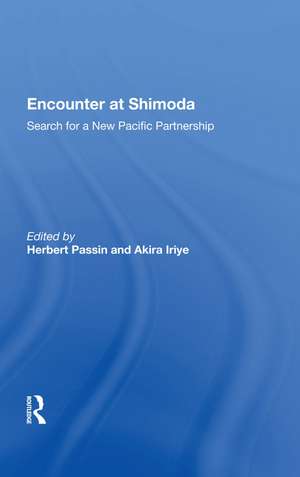Encounter At Shimoda: Search For A New Pacific Partnership
Editat de Herbert Passinen Limba Engleză Hardback – 7 iun 2019
Preț: 764.20 lei
Preț vechi: 1027.40 lei
-26% Nou
Puncte Express: 1146
Preț estimativ în valută:
146.30€ • 150.46$ • 121.37£
146.30€ • 150.46$ • 121.37£
Carte tipărită la comandă
Livrare economică 18 februarie-04 martie
Preluare comenzi: 021 569.72.76
Specificații
ISBN-13: 9780367020880
ISBN-10: 0367020882
Pagini: 282
Dimensiuni: 152 x 229 mm
Greutate: 0.45 kg
Ediția:1
Editura: Taylor & Francis
Colecția Routledge
Locul publicării:Oxford, United Kingdom
ISBN-10: 0367020882
Pagini: 282
Dimensiuni: 152 x 229 mm
Greutate: 0.45 kg
Ediția:1
Editura: Taylor & Francis
Colecția Routledge
Locul publicării:Oxford, United Kingdom
Cuprins
Published in cooperation with The Japan Center for International Exchange and The Japan Society -- Foreword -- Introduction -- The New Era of Japanese-U.S. Relations -- Shimoda—The View from 1967 -- Japan, the United States, and the International Order -- Security in Northeast Asia -- The Role of the United States in East Asia: A Legislative Perspective -- Japan and the United States: Security Issues in the Far East -- Japan’s Role in East Asian Stability -- Groping for Korean Unification -- Political and Economic Development in Southeast Asia -- Asian Development and the United States -- Toward a Reorientation of Asian Policy: The Fukuda Doctrine and Japanese-U.S. Cooperation -- A Reformist Vision of Southeast Asian Policy -- Japan and International Politics -- The Transformation in Japanese Domestic Politics and Japanese-U.S. Relations -- Japan, the United States, and the World Economy -- Free Trade Under Siege -- Some Considerations for Japan and the United States in Developing an Energy Strategy -- Administration of the World Economy and Japan -- Appendixes -- Participants in the Fourth Shimoda Conference -- The Agenda of the Fourth Shimoda Conference
Descriere
The United States and Japan are the two largest democracies in today’s world. The United States is still a superpower economically, militarily, and intellectually, but its traditional independence has changed to a position that requires cooperation and mutual understanding with its major allies and especially with Japan. Japan, also an economic super-power, enormously rich in human, economic, and intellectual resources, but very weak in natural resources, has an equal need for cooperation, military support, and teamwork on all levels. Both nations accept an obligation to contribute their resources fully toward the solution to the world’s problems. Consequently, new forms of dialogues and new instruments of cooperation must be devised based on a sophisticated, mutually agreed upon data base. These discussions from the Fourth Shimoda Conference (September 1-4, 1977) explore some of those new directions.
